Learning Across the Lifespan
“Learn from the past, live for today, hope for tomorrow.” ~ Albert Einstein
Learner Becoming Teacher Becoming Learner
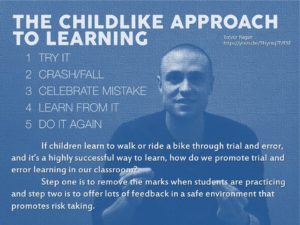
“Educational Postcard: A child’s approach to learning – trial and error” by Ken Whytock is licensed under CC BY-NC 2.0
How can reflecting on my years as an adolescent learner serve
me best as I embark on this new journey of becoming a teacher? By reading back on my own education experiences I hope to gain insight as to what methods and approaches brought most benefit to my learning, how and why I suffered setbacks, and ultimately what helped to pick me up and give me the confidence to carry on.
More appropriately, what specific teaching techniques and styles was I exposed to in the classroom, for what was simply known then as English, that drew me in to the written word and all its possibilities? In all likelihood, I was exposed to a multitude of learning methods, reasonably being somewhere between a behaviourist approach and the cognitive process of analyzing, and problem-solving. Of equal import, how did the nature of my own circuitous learning lead me to this point with a keen desire to immerse myself in this wonderful opportunity of educating our youth? I enter this profession with eyes wide open, inspired by fresh perspectives for teaching English Language Arts, no longer limited to a literature on the page, but an ever-expansive exploration of how, what, and why language (not only English), can and does teach us so much about ourselves, others, and the world around us. Learning should never be idle. And rather than continuing to conspire and be polluted by its contextualized, yet deep colonial roots of the English language itself, with its tight constructs, aspects of conformity, and its history of use in classifying, omitting, delegitimizing, subjugating and assimilating the other, I envision that its purpose can be reconfigured and receive an enlightenment from the outside perspective.
So, what do I actually gain from looking back 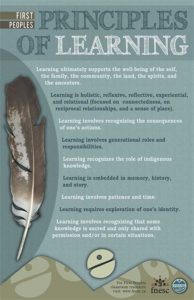 while seeking to move forward with a purpose? Naturally, some faulty logic falls upon the process, at least at first glance, of applying dated learning tendencies from a secondary school ELA experience lodged in the previous century; though, it is an endeavour not without merit for unearthing some hidden gems still applicable to 21st century learners. Indeed, for it is now the past we look to gain more enlightened and illuminating ways of knowing as received and applied through First Peoples’ Principles of Learning. My hope is that the process of reflecting back on the what and how of my learning will stand as a valuable resource to draw upon as I carve out a framework to help me engage with my future students. Knowing that when I received constructive feedback and elements of scaffolding to build upon prior learning, I was set up to achieve the desired outcomes. Lacking at times the discipline or the necessary tool-set to follow through on tasks, meant I was less equipped for self-directed learning and would struggle to adapt to changing dynamics in the classroom. Entwining this with Aboriginal ways of knowing I will seek to be open to the other, listen to and for their stories, and learn from them practicing patience and humility.
while seeking to move forward with a purpose? Naturally, some faulty logic falls upon the process, at least at first glance, of applying dated learning tendencies from a secondary school ELA experience lodged in the previous century; though, it is an endeavour not without merit for unearthing some hidden gems still applicable to 21st century learners. Indeed, for it is now the past we look to gain more enlightened and illuminating ways of knowing as received and applied through First Peoples’ Principles of Learning. My hope is that the process of reflecting back on the what and how of my learning will stand as a valuable resource to draw upon as I carve out a framework to help me engage with my future students. Knowing that when I received constructive feedback and elements of scaffolding to build upon prior learning, I was set up to achieve the desired outcomes. Lacking at times the discipline or the necessary tool-set to follow through on tasks, meant I was less equipped for self-directed learning and would struggle to adapt to changing dynamics in the classroom. Entwining this with Aboriginal ways of knowing I will seek to be open to the other, listen to and for their stories, and learn from them practicing patience and humility.
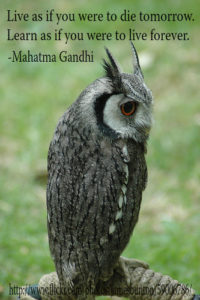
As a lifelong learner I envision that my teaching will evolve as I teach, benefit from the necessity of trial and error, and a growth in my comfort and confidence will be realized over time. Additionally I will seek to stretch myself as a reflective learner to one that practices reflexivity, hopefully maintaining habits that
maintain the learner in me, while cultivating the inner educator.
Spark Joy
“The mind is not a vessel to be filled, but a fire to be kindled.” ~ Plutarch
I hope that my students will find their voice and their passion in my classroom while growing in confidence through the challenges we encounter together. Holding to what I believe are not mutually exclusive goals of teaching critical thinking and experiencing an innate joy for learning, both from within and without of one’s perspective and worldview, I envision an environment that yields to students responsibly activating their autonomy . To encourage active citizenry in my students I will seek to help them build connections between themselves, the texts we read (view, critique, and create) and the world we live in. Through the creative use of the 4 learning modalities: colloquially known as “VARK” – Visual, Auditory, Reading/Writing & Kinesthetic learning styles, I will endeavour to be flexible and considerate of my learners’ preferences and needs as individual students. Creating engaging lesson plans, incorporating relevant, stimulating, and interactive activities, while experimenting and expressing ourselves through multimodal mediums, will assist student and teacher alike as we expand our learning and collectively grow our abilities.
Tool Box of the 21st Century Teacher
“The mediocre teacher tells. The good teacher explains. The superior teacher demonstrates. The great teacher inspires.”~ William Arthur Ward
Creating engaging lesson plans, incorporating relevant, stimulating, and interactive activities, while experimenting and expressing ourselves through multimodal media, will assist student and teacher alike as we expand our learning and collectively grow our abilities. Tapping into the BC Education Curriculum with its 3 cornerstones of “Know-Do-Understand”, specifically stated as “What students: will understand; will be able to do; and, will know”, gets further broken down to the 3 core elements of “the Content (Know), Curricular Competencies (Do), and Big Ideas (Understand), all working together to support deeper learning. Some of the tools and templates listed below are areas that most especially interest me and what I believe would help provide applicable learning opportunities in my classroom.
Developing Ground Rules for Literature Circles
Today’s accelerated pace to learning with its multitude of techniques and accompanying technological advancements available to the 21st century learner, would be unfathomable to a student of the 20th century. Equally important for a just and equitable Canadian society is to ensure equal access to what are now staples of an education system i.e. computers, tablets, other tech. gadgets, that go unnoticed for most children, but not for society’s most vulnerable. Concerningly, this same technological gap inevitably linked to a growing income gap sees many of the same children struggle, fall behind, and risk the potential of an unfulfilled education. A constructivist approach excites me to see how I could engage learners through many means; though, it is with some caution as I believe that method would need to be refined over time and via a thorough analysis of my students’ strengths and weaknesses.
Trust – A Teacher’s Best Friend
"The way to learn a person is trustworthy, is to trust him."~ Ernest Hemingway
I also want to be accessible (time to give my students and for them to feel comfortable confiding in me), relatable (be interested in my students’ lives), and a teacher that my students can trust (trust that I have their best intentions at heart). How can I impact a student in a positive and productive way that helps to stem the flow of negative thinking, lifts them up, and pushes them onto a path that they can believe in themselves? Let them know they’re valued, hold value, and are capable of carving out positive and life-affirming experiences.
Reaching Beyond Oneself
"We learn best when it's hard, when we're operating at the edge of our abilities, outside of our comfort zone, when we're in the wild." ~ Trevor Ragan
Embracing a growth mindset for me was not always an automatic. But, having overcome some of my own learning obstacles and directly challenging my questioning of my abilities, I hope to come alongside my future students and encourage them as they push through their own challenges. Albeit any career worth undertaking will not be without its own setbacks and discouragements, notwithstanding my advanced years at the undergoing of this journey, I will welcome any offer of help along the way. Undoubtedly, it will be from this cultivation of positive and encouraging “marigold” mentors, that I will find myself in good soil in which I can grow deep roots.
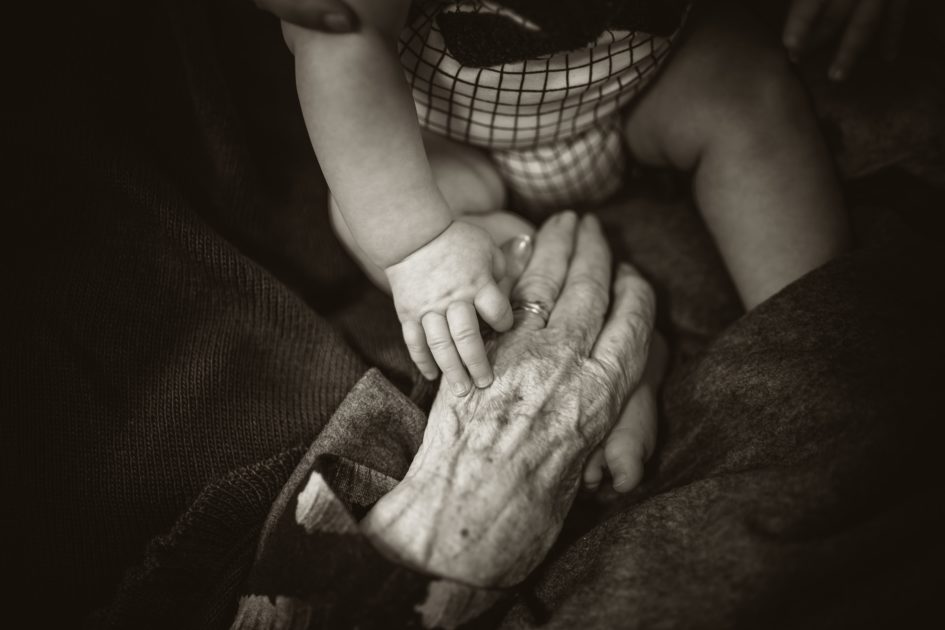
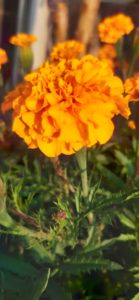
Leave a Reply
You must be logged in to post a comment.